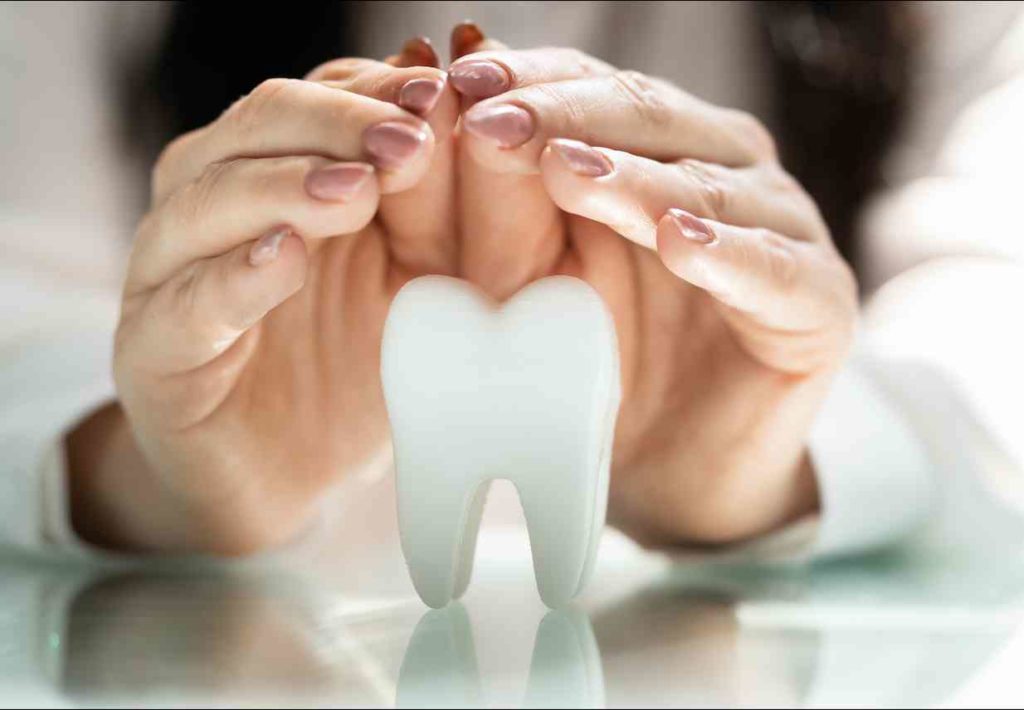Fitting a dental crown is a common procedure in dentistry. It is used to restore a damaged, broken, devitalized or missing tooth. It can also be used to strengthen a decayed tooth or improve the aesthetics of a dentition. But what should you do if your dentures come loose or get lost? Here's our advice on what to do in such a situation.
Why does a dental crown come loose?
The crown is fixed on a natural tooth or on a dental implant using a strong cementing material. Crowns can come loose as a result of trauma, decay or excessive wear. When this happens, there's no need to panic, even if it's unpleasant and uncomfortable.
Don't try to reattach it yourself, as this may cause further damage. While you're waiting for your dental appointment, you can try reinserting the crown temporarily. We recommend cleaning it thoroughly with lukewarm water to remove any residual dental cement. You can then apply a small amount of toothpaste or dental gel to the inside of the crown before replacing it on the tooth. However, this solution should only be used temporarily, and you should still consult a professional.
What happens at the dentist's?
When you visit your dentist, he or she will reassess your oral situation to determine the best approach to take. In some cases, if the crown is in good condition, the professional can successfully reinsert it. On the other hand, if the crown is damaged, or if the underlying tooth is also damaged, a new crown may have to be made.
Your dentist will also examine the possibility of using a different prosthetic technique. Dental bridges and dental implants can replace lost crowns. These options are potentially more durable, and often offer better dental aesthetics.
Please note, however, that this type of dental care are expensive, especially when it comes to dentures. Some treatments may be reimbursed by your health insurance or mutual dental insurance company. However, the amount reimbursed varies according to the type of prosthesis and the practitioner's fees. We therefore recommend that you have a good complementary insurance policy to ensure adequate coverage.
How can you prevent the loss of dental crowns?
To avoid losing dental crowns, we recommend that you maintain good oral hygiene. This includes regular brushing, flossing and mouthwash, as well as regular visits to the dentist for professional check-ups and cleanings.
How is a dental crown fitted?
Placing a dental crown is a procedure that requires careful preparation, precise fabrication and proper fit to ensure effective restoration and protection of a damaged tooth.
First, the dentist performs a thorough examination of the tooth in question, as well as the surrounding teeth and gums. X-rays are taken to assess the condition of the tooth and plan the treatment. Next, the practitioner prepares the tooth by trimming part of its structure to allow the crown to be fitted. This step is performed under local anaesthetic to reduce any sensation of pain or discomfort. Once the tooth has been prepared, the dentist takes precise dental impressions of the trimmed tooth and neighboring teeth. These serve as a model for the dental crown. While waiting for the crown to be made, the dentist places a temporary crown on the prepared tooth to protect it and maintain the aesthetics of the mouth.
The type of prosthesis used for a crown can vary according to the patient's needs. Dental crowns can be made from different materials such as ceramic, zirconia, metal alloys or a combination of these. The choice of material will depend on factors such as aesthetics, strength, masticatory function and patient preference.
The patient returns to the dentist for final placement. The dentist first checks the fit of the crown on the prepared tooth, as well as its appearance and shade. Once the necessary adjustments have been made, the crown is permanently fixed to the prepared tooth using special dental cement.
After the dental crown has been fitted, the patient may experience slight discomfort or sensitivity in the first few days, but this gradually disappears.
To remember:
If you lose a dental crown, it's important not to panic and to consult a dentist as soon as possible. He or she will assess your situation and recommend the best solution for replacing the lost crown. Thanks to advances in modern dentistry, there are many options for restoring your teeth and regaining a healthy appearance. dazzling smile.
Make an appointment with one of our HELVIDENT dental centers or clinics in Fribourg, Lausanne and Aigle to receive all the dental care you need.

